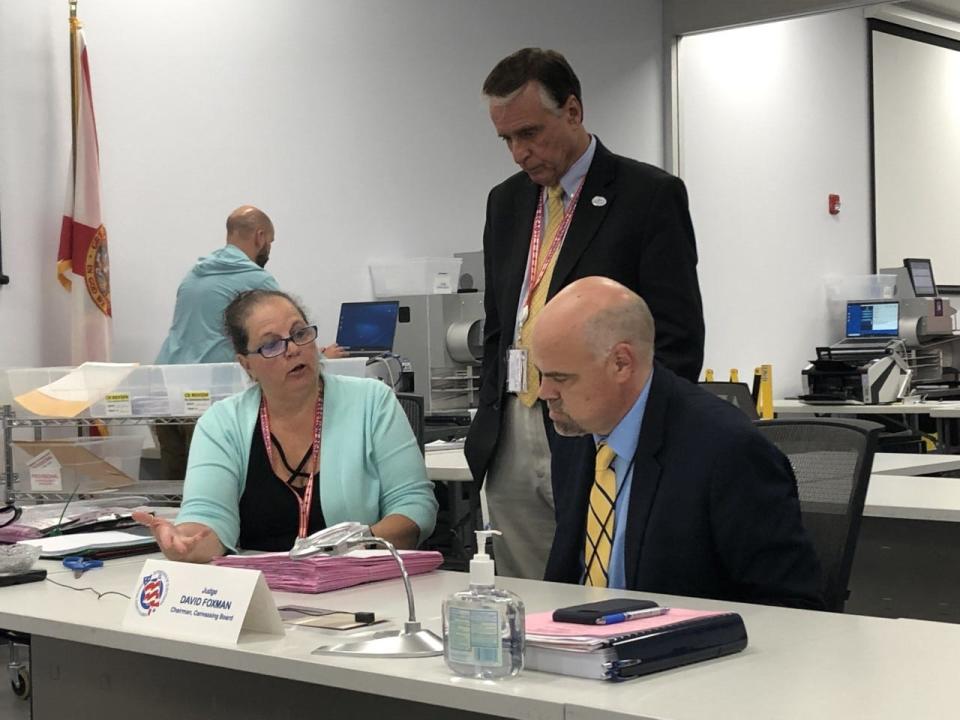Campaign finance, harassment of election workers. What's in Florida Senate Bill 7050?

- Oops!Something went wrong.Please try again later.
- Oops!Something went wrong.Please try again later.
Since the 2020 election − and the false claims by former President Donald Trump and others of widespread fraud − the Republicans who lead the Florida Legislature have changed dozens of voting laws.
Senate Bill 90 in 2021 made at least 14 changes, including making vote-by-mail ballots more difficult to obtain and placing limits on where and when election supervisors could make drop boxes available to voters wishing to return mail ballots.
Then, in 2022, lawmakers gave Gov. Ron DeSantis his Office of Election Crimes and Security to investigate violations and irregularities. Among 25 other changes was establishing harsher penalties against third-party organizations that fail to deliver timely voter registration applications.
And now, in 2023, the Senate Ethics and Elections Committee has brought a third election-reform bill, SB 7050, offering up 27 changes to the Elections Code. The bill passed that committee 6-3 on a party-line vote on Tuesday. Here are seven of the most significant proposals:

Reducing frequency of required campaign finance reports
Statewide candidates and political action committees, sometimes referred to as PACs, must by law file monthly contribution and expenditure reports until 60 days before the primary election when the deadlines move up to weekly. The reports must be filed daily starting on the 10th day before a general election, with the last report due on the fifth day before the election. The bill proposes reducing the frequency of reporting from monthly to quarterly until the qualifying period, at which time the current deadlines will resume.
Criminalizing harassment of election workers
While state law provides penalties for harassment of a person, the bill proposes a separate category: Harassment of election workers. It would make it a third-degree felony to "intimidate, threaten, coerce, harass" an election worker "with the intent to impede or interfere" with the worker's duties or to retaliate against an election worker for carrying out those duties.
Requiring first-time voters cast ballots in person
First-time Florida voters who have not gotten a state-issued driver's license or ID card or Social Security number would be required to vote in person, according to a legislative analysis. The only exception is "unless a federally mandated exception applies," the analysis states.
Increased fines for election law violations
Fines against political committees for campaign finance reports filed late are set at a maximum of $1,000 per violation. The bill would step up that maximum to $2,500 per violation and allow the Florida Elections Commission or an administrative law judge to triple that fine if a person commits three counts of the same category of offense.
New burdens on third-party voter registration organizations
Citizens can register to vote directly with their county's Supervisor of Elections Office, or they can sign up through an organization whose mission is to promote voting. These third-party organizations have operated in Florida for years under rules requiring them to register with the state and deliver to the elections supervisors every application they collect within 14 days.
The new bill proposes to require those organizations to re-register with the state for every general election cycle they plan to collect applications, rather than a one-time registration. It also proposes to decrease the number of days in which they must deliver a registration application, from 14 to 10 days, increases fines for late delivery, and requires the organization to give applicants receipts, in order to create a measure of accountability, according to Sen. Danny Burgess, R-Zephyrhills, chair of the Ethics and Elections Committee, who added that more than 3,000 registrations were submitted late in 2022. "I believe that 10 days is not only reasonable but critically important to make sure that it gets into the right hands and that it's secure," Burgess told the committee.

Changes to public notices
The bill proposes the elimination of requirements that supervisors publish certain information in a local newspaper's legal ads, instead allowing the supervisors to post those notices on their website or the county's website. These include notice of a special election or referendum 30 days prior and information on how a voter may update a signature.
Signature verification of vote-by-mail ballots
When mail-in ballots arrive, one of the ways elections supervisors can rest assured that votes are being cast by the right people is through signature verification. Each mail ballot must be signed by the voter and compared to a signature that's on file. The secretary of state provides training to supervisors and the canvassing board members who ultimately vote on whether to accept a questionable ballot. The latest bill makes that training mandatory not just for supervisors and canvassing board members, but also staff whose job duties include signature verification.
More elections changes: Republican senators move 98-page Florida election bill 24 hours after it becomes public
U.S. House panel: Florida elections officials harassed, threatened amid 'false accusations of fraud'
This article originally appeared on The Daytona Beach News-Journal: What changes are proposed in Florida Senate's new elections bill?

